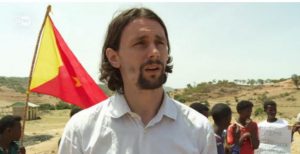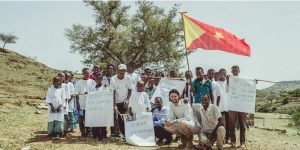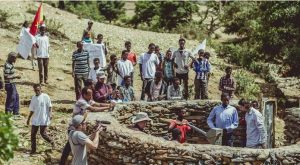Subotic: On the way for the children of Ethiopia

Football professional Neven Subotic tours the north of Ethiopia every year with his foundation. He wants to improve the lives of local people with different projects. DW accompanied him on a journey.
DW: Mr. Subotic, you founded your foundation when you were 22 years old. How did you come up with the idea of starting such a big project at this young age?
Neven Subotic: It did not happen overnight, but it was a long process. In the six or seven years before I founded the foundation, I tried to get involved in many ways. The disadvantage of this is that you can never really go deep into the projects. It simply lacks the time. My motivation has always been to be focused and to make a tangible contribution to the common good. At first, it was hard to understand what a foundation is or what it does. There are many different types and shapes, so I’ve thought twice about taking that step. But over time, I read more and more and then I really understood what opportunities this offers. Then the founding was the next logical step.
Was there a point in your life that made the difference to go that step and help other people?
This is primarily due to the way I was raised. My family has always served all family members and also the people in the church. But then there was war in Bosnia, and my parents came to Germany. Not only did they take on a job there, they also took on several jobs – not just to have a wonderful, great life and a lot of money, but to put aside families affected by the war in Yugoslavia with important goods such as medicine and food to stand. And that’s something I have always heard from my childhood and from my friends and acquaintances. Luckily I did not lose that. It is very firmly anchored in me since I was a child.

When I came to Germany to play football at the age of 17, I suddenly had these opportunities myself. My job has a lot of financial potential, and I wanted to use that too.
Your family has shaped you.
Yes, my parents encountered difficult circumstances back then in Germany. It was hard to find a job because many refugees had come to Germany at that time. For example, my father went from door to door in his small village near Stuttgart and asked if he could make the garden or repair something. Often it was rejected, but if you stay tuned and really convinced, then you will find a solution. That’s my experience too. It can be a lot of work sometimes, but I’m never too happy about that.
Do you have other role models besides your family that you can take a look at?
There are certainly some, and it is difficult to pick a person out. It really is a healthy mix of many personalities. I keep learning. For example, when I make new acquaintances, I try to take something out of every conversation. I’m also happy if someone disagrees completely, because then it’s also an enrichment. That’s why I’m also very open to new ideas and perspectives.
That sounds like a constant process going on in you. So it’s always working in you.
The people who know me know: I can not be on the beach, look at the sea and think: you made it! I just have a drive that is permanent. In this way, you always learn new things, and I enjoy achieving new milestones. There are always new challenges. At the same time, there are processes that repeat themselves on our travels in Ethiopia from year to year. Optimizing these and then looking at where we can work even better, more precisely and even more effectively – that’s just fun and welds together. It is my drive to really try to get the most out of myself, but also from my team, in the years that I am in the world.
You are traveling with your foundation in Ethiopia for the fourth time. How did you develop emotionally? What is the bond with the local people in the Tigray region?
When we land here, I feel like I’m coming home. This is mainly due to the great people I meet here.

